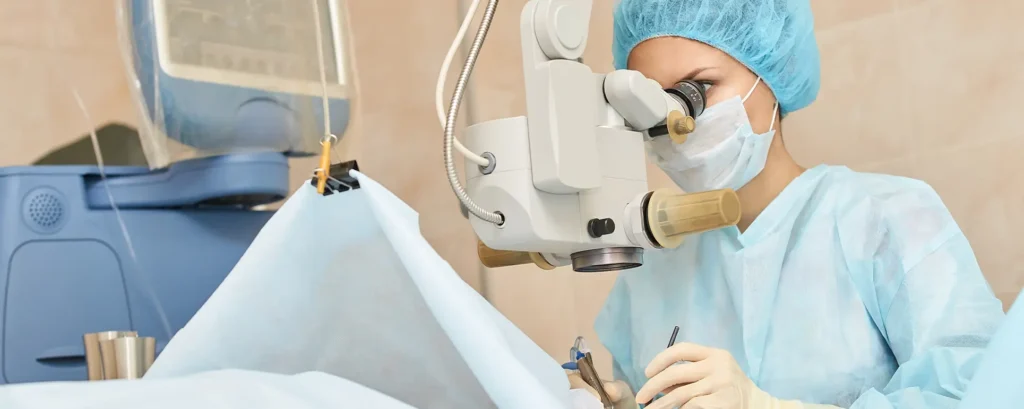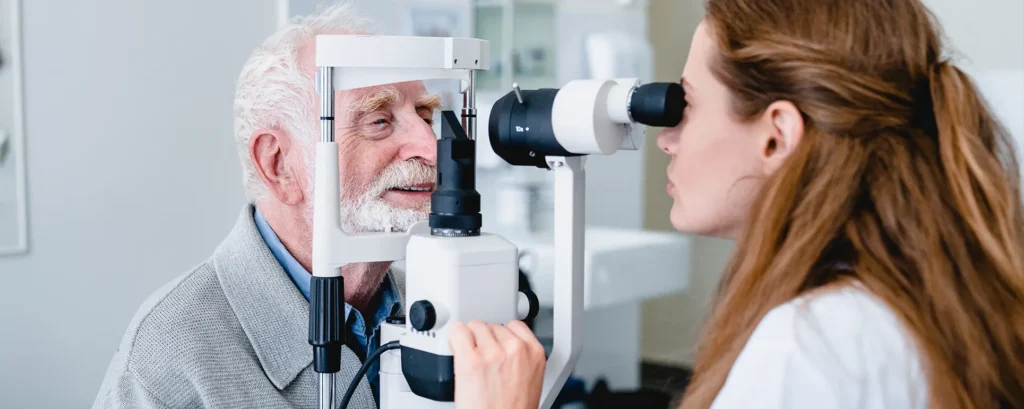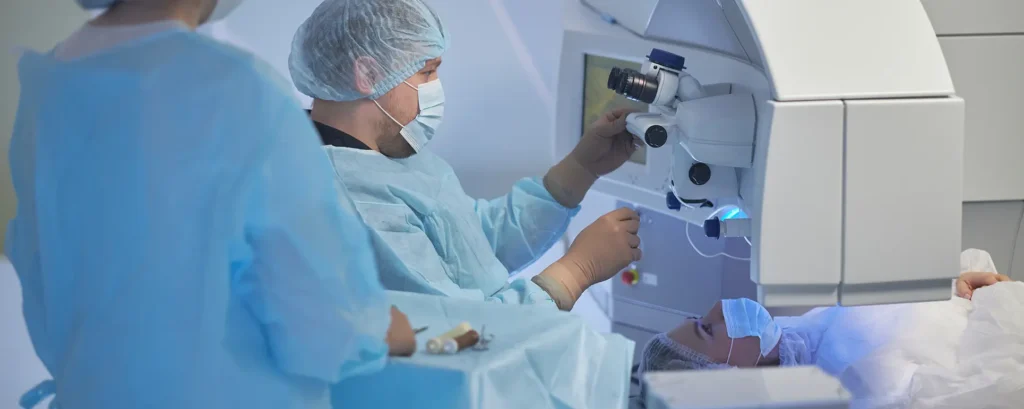If you’ve been told you need cataract surgery, one of the first big decisions you might face is whether to go through the NHS or pay for private treatment. On the surface, both paths lead to the same goal: removing the cloudy lens and restoring your vision. But the experience, options, speed, and long-term outcomes can vary significantly depending on which route you take. This guide is designed to walk you step-by-step through the decision-making process so you can feel confident you’re making the right choice for your eyes, your lifestyle, and your budget.
Step 1: Understanding How Cataract Surgery Works
Before diving into the differences between private and NHS cataract surgery, it helps to understand what the surgery involves. Cataract surgery is a quick, day-case procedure where the cloudy natural lens of your eye is replaced with a clear artificial intraocular lens (IOL). The aim is to restore clear vision and improve your quality of life. The surgery itself typically takes 10 to 20 minutes per eye and is performed under local anaesthetic.
Whether done privately or on the NHS, the surgical technique is usually similar: phacoemulsification (ultrasound energy to break up the cloudy lens) followed by lens implantation. Where things differ is in the availability of lens options, appointment speed, surgeon access, and personalised care. That’s where your decision comes in.
Step 2: Weighing Up Waiting Times

One of the most common reasons people consider private cataract surgery is the waiting list. The NHS is an incredible healthcare system, but demand often exceeds capacity. In many regions, you could wait several months from referral to surgery. Some patients have waited over a year, especially since the pandemic backlog.
In contrast, private clinics typically offer consultations within a few days and surgery within two weeks. This is a major advantage if your vision is affecting your work, driving, or independence. If you’re on a long NHS waitlist and your quality of life is suffering, the speed of private treatment might be a deciding factor.
Step 3: Lens Options and Vision Goals
NHS cataract surgery generally involves replacing the lens with a monofocal IOL, which corrects vision at one distance (usually for distance). This means most people still need glasses for reading or intermediate tasks. The NHS does not routinely offer premium lens options like multifocal or toric lenses unless you have a clinical need.
Private cataract surgery opens up a much wider range of lens choices. You can choose multifocal lenses (for near and far focus), extended depth-of-focus (EDOF) lenses, toric lenses for astigmatism, and even blended vision strategies. This allows you to tailor the outcome based on your lifestyle — for example, aiming to reduce your reliance on glasses entirely. If that’s important to you, private care gives you the freedom to choose.
Step 4: Cost Considerations
On the NHS, cataract surgery is free at the point of care. It’s covered under the NHS umbrella, so there’s no out-of-pocket cost for consultations, surgery, lenses (standard monofocal), or aftercare. It’s a brilliant option for those who don’t mind waiting or are happy with standard lenses.
Private cataract surgery, on the other hand, is a significant financial investment. Costs typically range from £2,500 to £4,000 per eye, depending on the lens you choose and the clinic. However, this cost often includes consultation, surgeon access, anaesthesia, premium lens, and follow-up care. Some private insurance policies may cover part of the procedure, but many people self-pay. It’s important to assess whether the extra cost is worth it to you in terms of speed, personalisation, and visual freedom.
Step 5: Surgeon Access and Continuity of Care
In the NHS, you might not know in advance who your surgeon will be. You may see different staff during the process, and while all NHS cataract surgeons are well-trained, the experience can feel less personal. The high demand also means consultation times are shorter and the aftercare is more standardised.
Privately, you usually have direct access to a named consultant from the initial consultation through to the surgery and aftercare. This continuity of care is reassuring for many patients and allows you to build trust with your surgeon. You also have longer, more in-depth consultations and more opportunity to ask questions and explore options.
Step 6: Aftercare and Follow-Up

NHS aftercare is generally limited to a standard post-op check, typically about four weeks after surgery. If you have any problems or need additional visits, you may go through your GP or local eye hospital.
Private clinics often offer more comprehensive aftercare, with one or more follow-up appointments included in the package. Some offer 24/7 contact numbers, fast-track appointments if issues arise, and detailed monitoring of your visual outcome. This extra support can be particularly valuable if you’re anxious about the recovery or want quick reassurance if anything feels off.
Step 7: Clinical Complexity and Co-Existing Eye Conditions
If you have a straightforward cataract and no other eye conditions, both NHS and private surgery are excellent options. However, if you have more complex issues — such as previous eye surgery, glaucoma, keratoconus, or corneal disease — then the route you take can affect the level of customisation you receive.
Private clinics often have more time, equipment, and flexibility to tailor treatment to complex eyes. You may also be able to access newer technologies like intraoperative aberrometry or advanced ocular imaging. The NHS does manage complex cases well, but the ability to individualise surgery in a private setting may tip the scales for some patients.
Step 8: GP and Optometrist Involvement
Your GP or optometrist may be involved in referring you for NHS care, and they might have preferences or advice based on local wait times or your health history. If you’re considering private surgery, many clinics accept self-referrals, and some GPs may even support this if they feel the NHS delay is affecting your wellbeing.
It’s worth discussing your options openly with your optometrist, as they often have good insight into both NHS and private pathways. They can help you weigh the pros and cons based on your clinical need and personal goals.
Step 9: Thinking Ahead to Both Eyes
Cataracts usually develop in both eyes, though often at different rates. In the NHS, surgery is typically done one eye at a time, with a gap between procedures that may stretch several months. This can be frustrating if your vision imbalance affects your comfort or function.
Private clinics often offer the option of quicker second-eye surgery — and in some cases, same-day bilateral surgery, known as ISBCS (immediate sequential bilateral cataract surgery). If reducing disruption to your work, travel, or lifestyle is important, this might be worth considering.
Step 10: Making the Final Decision

So, should you go private? That depends entirely on your priorities. If you’re happy to wait, are okay with wearing glasses after surgery, and have straightforward cataracts, the NHS route is highly effective and completely free. On the other hand, if you’re looking for fast access, lens customisation, enhanced aftercare, or a more personalised experience, then private cataract surgery could be a worthwhile investment.
It’s not just about cost — it’s about the kind of visual outcome and experience you want. There’s no universally right answer, but there is a right answer for you.
FAQs
- Is private cataract surgery better than NHS surgery?
Private cataract surgery isn’t inherently better in terms of surgical safety or basic outcomes — NHS cataract surgery is extremely effective and performed to high clinical standards. However, private treatment does offer greater flexibility in terms of lens options, appointment times, and surgeon access. Many patients find the private route more personalised, with additional consultation time and aftercare support. So while the surgery itself may be similar, the overall experience can differ quite a bit. - How long is the NHS cataract surgery waiting list?
Waiting times for NHS cataract surgery can vary depending on where you live and how stretched local services are. On average, it can take between 3 to 9 months from referral to surgery, but in some areas, it may be over a year. Delays are more likely if your visual impairment is considered less severe. These longer waits are one reason some patients decide to seek private care, particularly if their vision is affecting daily activities like driving or working. - Can I choose my lens on the NHS?
Under NHS care, most patients are offered a standard monofocal intraocular lens, which corrects vision at a single distance — usually for distance viewing. This means you’ll likely still need reading glasses. The NHS generally does not provide access to premium lenses such as multifocal, EDOF, or toric lenses unless there’s a specific clinical need. If reducing your dependence on glasses is important to you, private surgery may be the only route to access these lens technologies. - Does private cataract surgery hurt?
No — private cataract surgery, just like NHS surgery, is carried out under local anaesthetic. You’ll be awake but relaxed, and the eye is completely numbed so you won’t feel pain. Most patients report only a sensation of pressure or slight movement during the procedure. If you’re particularly anxious, some private clinics may offer light sedation as part of the experience, which can help you feel more at ease throughout. - Will private insurance cover cataract surgery?
Some private health insurance policies do include cataract surgery, but the level of cover can vary. Many policies will only fund monofocal lens implants and may not include the cost of premium lenses or additional services. It’s essential to check with your insurer before committing, and some clinics can help by providing itemised quotes for submission to your provider. If your insurance doesn’t cover it, many clinics offer self-pay packages or interest-free finance options. - Can I switch to private care after being referred on the NHS?
Yes, you can switch from NHS to private care at any point. If you’re on an NHS waiting list but feel the delay is affecting your quality of life, you’re free to seek private treatment without needing to restart the entire referral process. Some private clinics will even help transfer your notes or diagnostic information to speed things along. It’s perfectly acceptable to explore both options — and switch based on what feels right for you. - How do I find a good private cataract surgeon?
Look for a consultant ophthalmologist who is GMC-registered and has a subspecialty interest in cataract and refractive surgery. Many top surgeons also work within the NHS, so it’s worth checking their credentials, experience, and patient reviews. It’s a good idea to read about the clinic too — including whether it offers advanced diagnostic technology, a choice of lenses, and thorough follow-up. A consultation can also give you a feel for the surgeon’s approach and bedside manner. - What does the private cataract surgery package usually include?
Most private cataract surgery packages are comprehensive and cover your consultation, diagnostic tests, the procedure itself, the intraocular lens (including premium options if chosen), anaesthetic, and at least one post-operative check-up. Some clinics also offer unlimited aftercare for a period of time, while others provide a direct contact number if you have concerns after surgery. Always ask for a full breakdown so you know what’s included and whether anything will incur an extra cost. - Can I have cataract surgery in both eyes on the same day?
In NHS settings, cataract surgery is usually done one eye at a time, with a few weeks or months between procedures. However, some private clinics offer immediate sequential bilateral cataract surgery (ISBCS), which means both eyes can be treated in the same session if you’re a suitable candidate. This approach can speed up your recovery and reduce time off work or travel, although not everyone qualifies — your surgeon will assess your general and ocular health before offering this option. - Will I need glasses after private cataract surgery?
It depends on the type of lens you choose. If you opt for a monofocal lens (like on the NHS), you’ll likely still need reading or intermediate glasses. However, private surgery gives you access to premium lenses — such as multifocal or extended depth-of-focus (EDOF) — which are designed to reduce or eliminate your need for glasses entirely. Results vary from person to person, but many patients who choose these advanced lenses find they can manage most daily activities without spectacles.
Final Thoughts
Deciding between NHS and private cataract surgery is personal. Both routes offer excellent outcomes, but they differ in speed, choice, and experience. At London Cataract Centre, we understand that your vision is precious — and we’re here to help you make the decision that suits you best. If you’d like to explore your private options, get in touch with us and let us guide you every step of the way.

